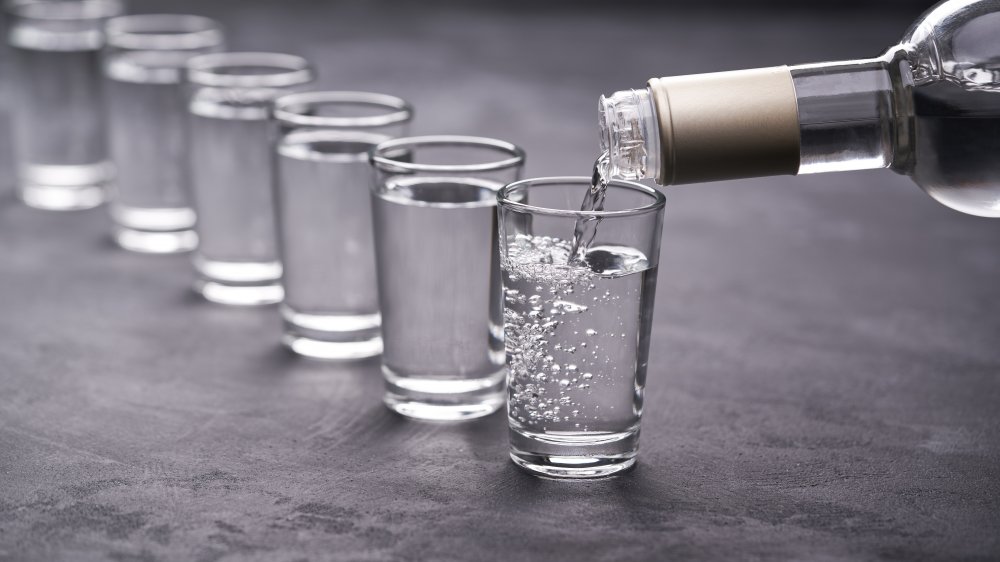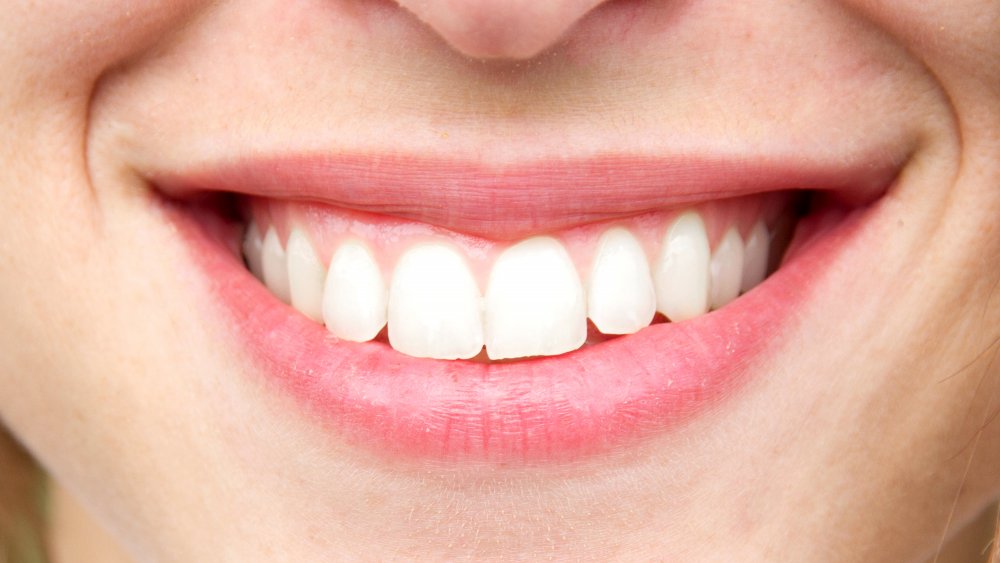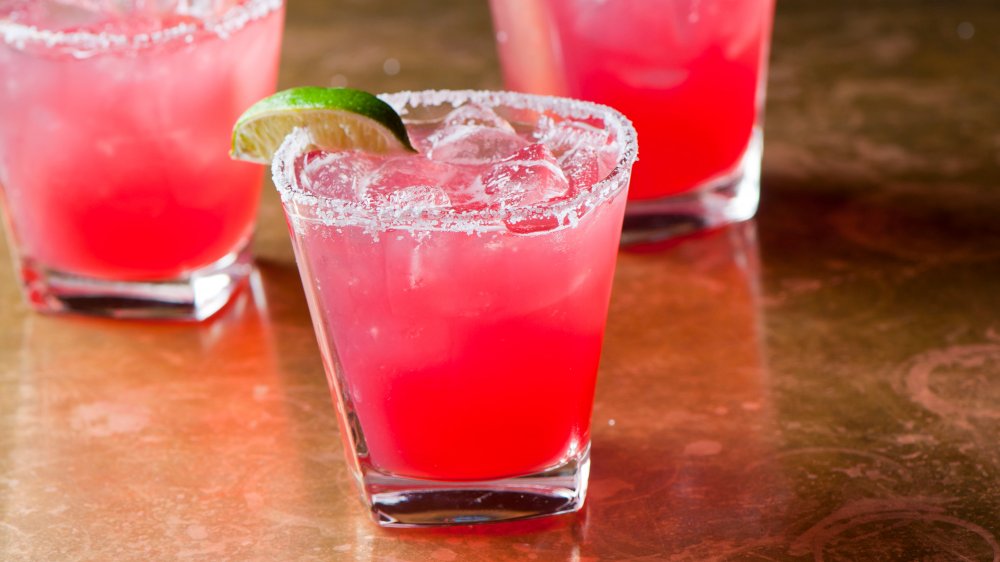When You Drink Vodka Every Night, This Is What Happens To Your Body
Ah, vodka. After a long day at work or at a particularly stressful event, there are few things more refreshing than a cold vodka cocktail. After all, a serving of vodka delivers a nice punch of alcohol to your system, relaxing you and getting the dopamine flowing in your brain. Suddenly you're less worried than you were before and enjoying the warmth of the beverage as it spreads through your body.
In addition to those properties, vodka is quite the versatile alcoholic beverage, rendering it a good selection for pairing with mixers for a tasty drink that packs a punch. And for the most part, vodka is fairly affordable, with plenty of brands selling bottles that don't taste all that bad, even without a mixer that masks the alcoholic flavor.
So are you a person who likes to drink vodka every night? Are you wondering what the effects might be on your body and its systems and whether they're good or bad? Read on to discover exactly what happens to your body when you drink vodka every night.
Your mood may improve if you drink vodka every night
Indeed a serving of vodka has a mood-boosting effect that makes you feel happy and content, as noted by Laura Krebs-Holm, a registered dietitian. "Like most alcoholic beverages, vodka can help you relax," she told The List. "Additionally, many people enjoy a drink in the company of others, which can also help to improve mood." Perhaps that's why so many people like to drink in bars or serve drinks at parties and special events.
In addition to the dopamine that alcohol consumption can stimulate, there are other mechanisms at work that get your good feelings going when you drink vodka every night, according to an article in Live Science. Most notably, drinking alcoholic beverages stimulates the release of endorphins, hormones that make you feel pleasure and dull pain. Those are the same chemicals that are triggered when you do other pleasurable activities, such as eating, exercising, and getting intimate.
This is what could happen to your mouth if you drink vodka every night
It might sound a little weird given the wide variety of cleaning products at your neighborhood grocery store, but vodka, like other spirits, is an antiseptic, according to McGill University. So if you're ever in a pinch, you can use vodka to clean your house, sterilize a wound, or clean anything that needs to be disinfected on the fly — just make sure there are no additives in it other than water! That would render it less sterile.
Vodka's cleaning properties could also be used for your mouth, according to James Cobb, a registered nurse. "If you swish vodka around in your mouth a bit before swallowing your dental hygiene might improve," he explained to The List. "Vodka is an antiseptic." He noted that vodka could potentially help prevent "dental cavities." Cobb cautioned, however, that if you drink too much vodka the negative consequences will negate any oral benefits.
According to Healthline, vodka could possibly dry out drinkers' mouths and cause harm since saliva is "one of the mouth's natural defenses against damage." So, if you want to drink vodka every night, just be aware that the effects on your oral health could be mixed.
You may lose weight if you drink vodka every night
The choice to drink vodka every night in and of itself isn't going to magically make you lose weight, though that would be a pretty incredible thing. But if you opt for vodka over beer and wine for your go-to drink, or are switching to vodka instead of something like schnapps to see what happens, you might lose weight, as noted by registered dietitian Laura Krebs-Holm. "Like other distilled spirits, vodka is lower in calories than beer or wine per serving," she revealed to The List. "One shot (1.5 fl oz) of vodka has about 90 calories." And because you presumably won't need to drink as much vodka as you would beer or wine to feel the same effects, that caloric count really isn't bad!
Just remember to be mindful when you pair your vodka with any mixers to offset the taste of the alcohol. "However, if it is mixed with sugar-sweetened mixers, juices, simple syrup, or high calorie sodas, it may impact your efforts to lose weight," Krebs-Holm added. So stick to seltzer water, a hint of lime juice, or diet sodas or juices if you're looking to drop a few pounds.
If you drink vodka every night, it may have an impact on your sleep
Do you ever have problems falling asleep at night no matter how tired you are or how busy your day was? Have you turned to drinking a shot of vodka every night at bedtime to help you relax and best your insomnia? Well, that can have both good and bad effects, according to registered nurse James Cobb. "If you drink a moderate amount of vodka before bed it might cause you to fall asleep faster and to sleep deeper," he shared with The List. "Unfortunately, the sleep won't be of the highest quality." So while it's certainly better than no sleep at all, the sleep you'll get after drinking won't be as good as old-fashioned natural sleep.
The reason for this, according to Cobb, is because vodka has an impact on one specific kind of sleep. "All alcohol affects the REM (Rapid Eye Movement) cycles," he continued. "REM sleep is important for things like learning and brain health, and while that might suffer you may feel rested." So your mileage may vary if you drink vodka every night.
Your cholesterol levels might drop if you drink vodka every night
Curious about what impact your vodka nightcap might have on your cholesterol levels? As it turns out, drinking a moderate amount of vodka every night might be good for them, as noted by registered dietitian Laura Krebs-Holm. "One study suggests that vodka and wine may help improve cholesterol levels by boosting the HDL cholesterol (also referred to as 'good cholesterol') in the blood," she told The List. "Another study found that both red wine and vodka may help cardiovascular health by increasing blood vessel formation."
That doesn't mean you should start to drink vodka every night just for the potential positive effect it might have on your cholesterol levels — focusing on your eating and exercise habits is a much smarter way to do that. Also, don't negate any of the good benefits of vodka by mixing it with sugary drinks, which can raise your bad cholesterol and your triglycerides, according to Healthline. Instead, use low-calorie mixers or add herbs and a kiss of fresh fruit to enhance your drink's flavor.
If you drink vodka every night, your tolerance may increase
Have you noticed that the longer you drink vodka every night, the more alcohol you need to get to the same level of intoxication? That's not uncommon, as noted by registered dietitian Laura Krebs-Holm. "Many people find that if they drink alcohol regularly, they do not feel the effects of alcohol as keenly with one or two drinks," she shared with The List. "However, health benefits have only been linked to moderate alcohol consumption, which is one drink for women, and two drinks for men."
Additionally, that's something that can be amplified as you grow older, according to Dr. Nick Knight. "People don't really know why but I suspect it's something to do with the fact that the more exposure to alcohol you have, the more the key enzymes that break down alcohol in your liver increase," he shared in an interview with the BBC's Newsbeat. "That's why people talk about having an increased tolerance to alcohol, because the liver has adapted to cope with it."
If you drink vodka every night, your blood pressure may decrease
According to the CDC, approximately 29 percent of Americans have high blood pressure, which is about 75 million people. Unfortunately, having high blood pressure can make you much more likely to be at risk for heart disease and stroke, which are super common causes of death in the United States.
On the bright side, if you drink vodka every night, it just might improve your blood pressure, according to Laura Krebs-Holm, a registered dietitian. "Moderate alcohol consumption has been linked to improved blood pressure due to its ability to relax blood vessels and help with increasing new blood vessel formation," she revealed to The List. "That said, those with high blood pressure should avoid drinking alcohol, vodka or otherwise, as this can lead to an increase in your already high blood pressure." Instead, to lower your blood pressure, do the same things you would do to keep your cholesterol down: mind your diet, get plenty of exercise, and quit smoking. Ready to give up cigarettes? Here's what happens to your body when you quit smoking.
You might have a hangover the next day if you drink too much vodka every night
After you drink vodka drinks all night long, do you find yourself waking up in the morning feeling awful? Do you swear on those mornings that you're never drinking again? It's highly likely that you're having a hangover, which can happen after drinking too much alcohol, according to the Mayo Clinic. If you've ever had a hangover before, you know full well just how horrible they can be.
Although you can take steps to prevent and treat hangovers — these breakfasts will help you combat any hangover — the exact science at work is a bit blurry, according to Dr. Regina Krel, a specialist at the Headache Center at the Neuroscience Institute at Hackensack University Medical Center. "The actual mechanism of what happens during a hangover is still not clear but is thought to be a result of the toxicity of acetaldehyde on the body, changes in electrolytes, dehydration, and low blood sugar," she explained in an interview with Hackensack Meridian Health. "The most common symptoms during a hangover include headache, nausea, dizziness, feeling sleepy or sluggish." So, in order to avoid hangovers, you might not want to drink vodka every night — or at least not more than one glass.
If you drink vodka every night in large amounts, it could impact your cognitive function
If you only drink one vodka cocktail every night, you're not going to wind up slurring your speech or stumbling around. But if you are knocking back shot after shot, that can have a real impact on your cognitive function, according to Dr. Nick Knight. "A number of processes slow down," he shared in an interview with the BBC's Newsbeat. "You get a reduction in your executive function, so judgement, your decision making." He added, "You become less inhibited and you are tempted to take more risks than you would usually."
That's why you should absolutely never drive after drinking a lot of alcohol, as it can be extremely dangerous, as noted by Dr. Knight. "In the case of driving, you think you can make that corner, you think there is enough space between you and the car in front, and so on," he continued. "There's the physical aspect too: the motor skills. This is how we use our arms and legs and our hands, how we make that decision to turn the wheel when we drive." So, if you want to drink vodka every night, be sure to limit yourself.
Your immune system may weaken if you drink vodka every night in excess
Have you noticed that ever since you started drinking vodka every night that you've been more likely to get sick during cold and flu season? Did you used to never get sick, but now you can't seem to avoid it? If so, it's possible that your daily vodka intake is responsible for you getting under the weather, according to the Cleveland Clinic. That's because alcohol can have a negative impact on your immune system, rendering you more vulnerable to the flu, colds, and other infections.
Of course, if you're just having a moderate amount of vodka every day, you're probably not going to feel sick all the time. In fact, having a serving of alcohol every day can boost your immune system, according to Medical News Today when reporting on a study published in the journal Vaccine. But if you're drinking a lot, there's a good chance you're going to catch whatever is going around — and that's definitely not a good thing. So, if you want to drink vodka every night, don't do so in excess.
Your digestion may suffer if you drink too much vodka every night
Decompressing after work with a single vodka soda is a perfectly reasonable way to unwind, especially if it's been a long or difficult day. But if you drink vodka constantly from the moment you get home until the second you go to bed, you might be damaging your digestive tract in a variety of ways, according to Healthline.
For one, drinking too much vodka can cause gassiness, diarrhea, painful bowel movements, a feeling of fullness in your abdomen, and bloating. Additionally, it can cause you to develop hemorrhoids, ulcers in your stomach, and even internal bleeding, which is about as dangerous as it sounds. Drinking too much vodka every night can also damage your intestines, which can lead to malnutrition as your body can't absorb nutrients from food properly. And if you're malnourished, you're at risk for a whole host of medical problems, according to Medical News Today.
You could damage your organs if you drink vodka every night in excess
It's not just your digestive organs that can be damaged from drinking too much vodka every night. Rather, pretty much every organ in your body takes a beating when you overindulge in alcohol in different ways, and none of them are pretty.
According to Healthline, if you imbibe too much vodka every day for years at a time, the following can occur: Your frontal lobe can shrink, your heart can be damaged, you can be more prone to lung disease, your liver function can drop, you could develop pancreatitis, you could struggle with infertility, your bones may thin, and you might damage your central nervous system. And if you become physically dependent on alcohol, withdrawal symptoms can include anxiety, irregular heartbeat, high blood pressure, nausea, tremors, and even hallucinations. Finally, if you drink vodka every night while pregnant, not only are you at a higher risk of miscarriage, but the baby could be born with fetal alcohol syndrome.
With all of those devastating effects, it's clearly a good idea to drink in moderation and to be careful not to overindulge.
If you drink vodka every night, you could increase your risk for cancer
Unfortunately for people who drink vodka every night, ingesting alcohol every day has been linked with an increased risk of disease, according to researcher Dr. Sarah M. Hartz. "Consuming one or two drinks about four days per week seemed to protect against cardiovascular disease, but drinking every day eliminated those benefits," she explained in an interview with Medical News Today. "With regard to cancer risk, any drinking at all was detrimental."
That doesn't mean you have to give up vodka altogether if you're concerned about cancer risk, but drinking it daily might not be the safest approach, as noted by Noelle LoConte, an oncologist and associate professor at the University of Wisconsin. "We're not proponents of complete abstinence. There probably is an amount of drinking that's OK," she shared in an interview with NPR. "But from a cancer-prevention standpoint, drinking the least amount of alcohol possible would be the best strategy."
If you drink vodka every night in large quantities, you might become dependent on alcohol
If you drink vodka every night in large amounts, there's a chance that you can become dependent on it, according to Dr. Howard C. Becker, a professor of psychiatry. "Continued excessive alcohol consumption can lead to the development of dependence that is associated with a withdrawal syndrome when alcohol consumption is ceased or substantially reduced," he penned in an article in Alcohol Research Current Reviews. "This syndrome comprises physical signs as well as psychological symptoms that contribute to distress and psychological discomfort." That does not sound pleasant.
In order to avoid becoming dependent on alcohol, or developing any of the other associated health risks that can come with drinking it, you should watch out for signs that you drink too much. Abstinence may be the best option, according to Medical News Today. That means that drinking vodka every day is indeed a roll of the dice for your health. But according to the CDC, moderate alcohol consumption — which is one drink per day for women and two drinks per day for men (and not every day) — is the recommendation when you do drink.
If you want to cut back on liquor, here's what happens to your body when you stop drinking alcohol.














